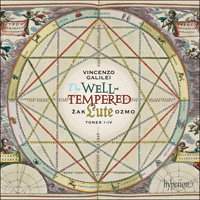Texte paru dans: / Appeared in:
|
|
|
Appréciation d'ensemble / Overall evaluation :
|
|
|
Reviewer: Paul Riley Galileo might be the most renowned scion of the Galilei dynasty, but he wasn't the only family member with a taste for new ideas and scientific discovery. His lutenist father Vincenzo was a leading light of the Florentine Camerata, a sometime pupil of the great Venetian theorist Zarlino, and made important breakthroughs in the science of vibrating strings. And as one of the early adopters of the emerging art of monody, he helped to facilitate the birth of opera. Indeed almost a century and a half before the appearance of Bach's Well-Tempered Clavier, Galilei also explored the viability of equal temperament tuning, devising dance sets working their way through the 12 notes of the chromatic scale and set forth in his landmark Libro d'intavolature di liuto of 1584.
Zak Ozmo delves into Parts 1 & 2, capping a Passamezzo antico and Romanesca antica with a Saltarello, before reaching for their 'moderno' equivalents and then ascending a semitone to the next group. Galilei himself wrote of the 'excited sound' of the Romanesca, yet Ozmo can prove decorously measured. Occasionally too, there's no disguising the music's considerable technical demands, but the founder-director of L'Avventura London is a thoughtful guide to music that doesn't always yield its secrets easily. | |
|
|
|
|
|
|
|
Cliquez l'un ou l'autre
bouton pour découvrir bien d'autres critiques de CD |
|



